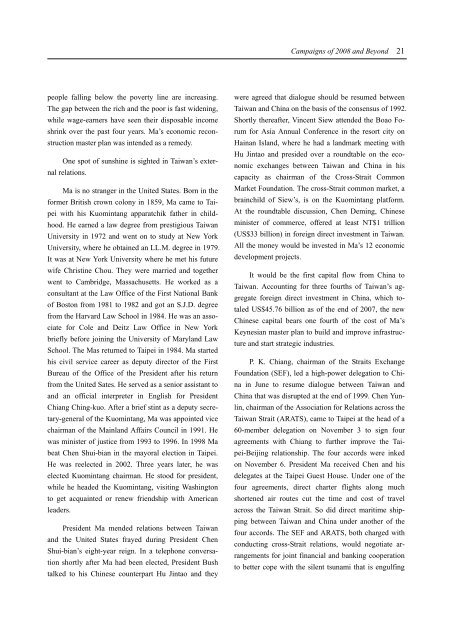PDF(2.7mb) - 國家政策研究基金會
PDF(2.7mb) - 國家政策研究基金會
PDF(2.7mb) - 國家政策研究基金會
You also want an ePaper? Increase the reach of your titles
YUMPU automatically turns print PDFs into web optimized ePapers that Google loves.
Campaigns of 2008 and Beyond 21<br />
people falling below the poverty line are increasing.<br />
The gap between the rich and the poor is fast widening,<br />
while wage-earners have seen their disposable income<br />
shrink over the past four years. Ma’s economic reconstruction<br />
master plan was intended as a remedy.<br />
One spot of sunshine is sighted in Taiwan’s external<br />
relations.<br />
Ma is no stranger in the United States. Born in the<br />
former British crown colony in 1859, Ma came to Taipei<br />
with his Kuomintang apparatchik father in childhood.<br />
He earned a law degree from prestigious Taiwan<br />
University in 1972 and went on to study at New York<br />
University, where he obtained an LL.M. degree in 1979.<br />
It was at New York University where he met his future<br />
wife Christine Chou. They were married and together<br />
went to Cambridge, Massachusetts. He worked as a<br />
consultant at the Law Office of the First National Bank<br />
of Boston from 1981 to 1982 and got an S.J.D. degree<br />
from the Harvard Law School in 1984. He was an associate<br />
for Cole and Deitz Law Office in New York<br />
briefly before joining the University of Maryland Law<br />
School. The Mas returned to Taipei in 1984. Ma started<br />
his civil service career as deputy director of the First<br />
Bureau of the Office of the President after his return<br />
from the United Sates. He served as a senior assistant to<br />
and an official interpreter in English for President<br />
Chiang Ching-kuo. After a brief stint as a deputy secretary-general<br />
of the Kuomintang, Ma was appointed vice<br />
chairman of the Mainland Affairs Council in 1991. He<br />
was minister of justice from 1993 to 1996. In 1998 Ma<br />
beat Chen Shui-bian in the mayoral election in Taipei.<br />
He was reelected in 2002. Three years later, he was<br />
elected Kuomintang chairman. He stood for president,<br />
while he headed the Kuomintang, visiting Washington<br />
to get acquainted or renew friendship with American<br />
leaders.<br />
President Ma mended relations between Taiwan<br />
and the United States frayed during President Chen<br />
Shui-bian’s eight-year reign. In a telephone conversation<br />
shortly after Ma had been elected, President Bush<br />
talked to his Chinese counterpart Hu Jintao and they<br />
were agreed that dialogue should be resumed between<br />
Taiwan and China on the basis of the consensus of 1992.<br />
Shortly thereafter, Vincent Siew attended the Boao Forum<br />
for Asia Annual Conference in the resort city on<br />
Hainan Island, where he had a landmark meeting with<br />
Hu Jintao and presided over a roundtable on the economic<br />
exchanges between Taiwan and China in his<br />
capacity as chairman of the Cross-Strait Common<br />
Market Foundation. The cross-Strait common market, a<br />
brainchild of Siew’s, is on the Kuomintang platform.<br />
At the roundtable discussion, Chen Deming, Chinese<br />
minister of commerce, offered at least NT$1 trillion<br />
(US$33 billion) in foreign direct investment in Taiwan.<br />
All the money would be invested in Ma’s 12 economic<br />
development projects.<br />
It would be the first capital flow from China to<br />
Taiwan. Accounting for three fourths of Taiwan’s aggregate<br />
foreign direct investment in China, which totaled<br />
US$45.76 billion as of the end of 2007, the new<br />
Chinese capital bears one fourth of the cost of Ma’s<br />
Keynesian master plan to build and improve infrastructure<br />
and start strategic industries.<br />
P. K. Chiang, chairman of the Straits Exchange<br />
Foundation (SEF), led a high-power delegation to China<br />
in June to resume dialogue between Taiwan and<br />
China that was disrupted at the end of 1999. Chen Yunlin,<br />
chairman of the Association for Relations across the<br />
Taiwan Strait (ARATS), came to Taipei at the head of a<br />
60-member delegation on November 3 to sign four<br />
agreements with Chiang to further improve the Taipei-Beijing<br />
relationship. The four accords were inked<br />
on November 6. President Ma received Chen and his<br />
delegates at the Taipei Guest House. Under one of the<br />
four agreements, direct charter flights along much<br />
shortened air routes cut the time and cost of travel<br />
across the Taiwan Strait. So did direct maritime shipping<br />
between Taiwan and China under another of the<br />
four accords. The SEF and ARATS, both charged with<br />
conducting cross-Strait relations, would negotiate arrangements<br />
for joint financial and banking cooperation<br />
to better cope with the silent tsunami that is engulfing

















